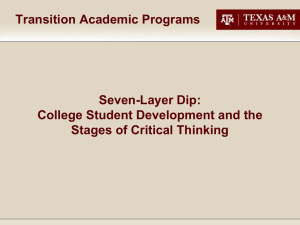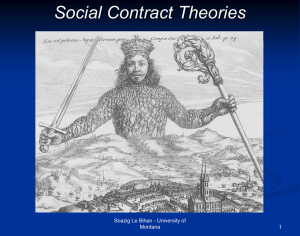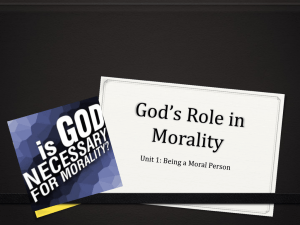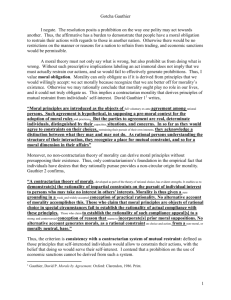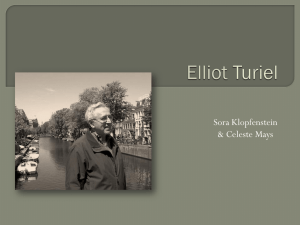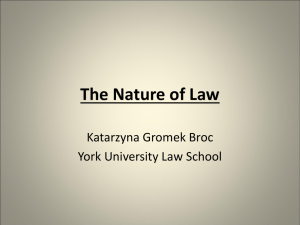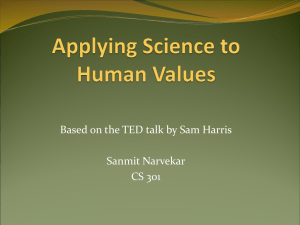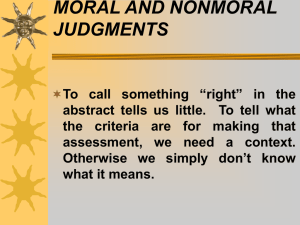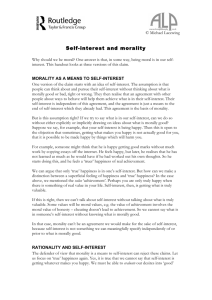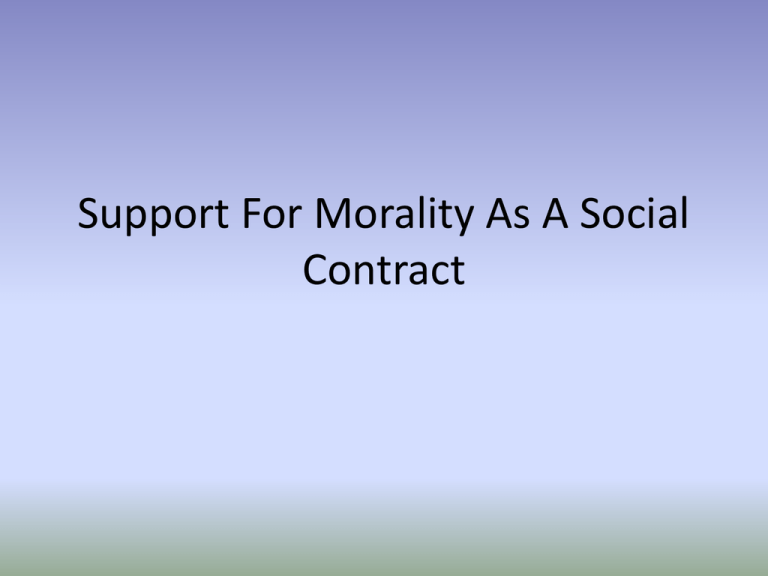
Support For Morality As A Social
Contract
The Prisoner’s Dilemma
You and another person have been arrested. You are accused of having committed a
crime. It does not matter if you did it, or who the other person is. You are a ‘rational
egoist’, meaning you are only interested in what is best for you, and you are capable of
thinking logically and rationally in order to achieve it. Basically, you are smart and
selfish. You and the other person can either confess or say you didn’t do it. You are
not able to communicate with the other person.
There are 4 possible outcomes:
1. You confess and the other person denies the crime.
Result – you go to prison for 10 years and the other person goes free.
2. The other person confesses and you deny the crime.
Result – you go free and the other person goes to prison for 10 years.
3. You both confess.
Result – you both go to prison for 1 year.
4. You both deny the crime.
Result – you both go to prison for 5 years.
What option would you take?
• So The Prisoner’s dilemma shows that if we
always act out of self-interest, we ultimately
lose out – others won’t cooperate with us.
The ‘Free Rider’ Problem
• The Prisoner’s Dilemma shows that
cooperating can be better than everyone
acting out of self-interest.
• Suppose that, realising the benefits of
morality, we agree with each other to act
morally. Now we know that, by and large, we
can trust each other.
• Suppose now that you don’t confess, trusting
that the other person won’t either. The other
person suspects that you trust him not to
confess – so now the options they have to
choose between are either not confessing and
getting 2 years, or confessing and walking
free. This means that if they have good reason
to believe that you trust him then he is better
off acting self-interestedly.
• Everyone acting morally is better than
everyone acting self-interestedly. But if
everyone else is acting morally, it is even
better to act self-interestedly, at least if you
can get away with it.
• This is called the ‘free rider’ problem –
someone who does this gets the benefits of
morality (other people trust him, do things for
him), but he doesn’t bear the costs of acting
morally because he cheats people.
The Problem
• It turns out that whether I have reason to conform to
the expectations of morality depends on whether I can
get away with acting immorally when other people are
acting morally. If I can, then I have more reason to act
immorally than to act morally.
• Morality as an agreement is in everyone’s self-interest,
collectively, to set up. But once it is set up, it is in each
person’s self-interest, individually, to get away with
breaking the agreement, if they can avoid punishment.
What Do You Think?
• Do you think it is really in someone’s selfinterest to act this way? Why/why not?
• What potential problems can you see?
How Can We Answer the ‘Free Rider’ Problem?
• A Tacit Agreement:
– Some philosophers respond that morality can be understood as
a tacit agreement (unspoken).
– This view is defended by people who want to explain morality in
the descriptive sense, that is, why we have the particular moral
practices we do.
– For example, why has there been a ‘double standard’ about sex?
In many societies, it is seen as morally bad for a woman to sleep
with many men, but more acceptable for a man to sleep with
many women. This seems very unfair – we can explain it if we
think of our moral code as a tacit agreement between people
who have power, in this case men.
– If morality is this kind of agreement based on power, then it is
not an agreement for the mutual advantage of everyone. So you
only have reason to be moral if you are one of the powerful
people morality benefits.
– So if we take a realist approach to morality being an agreement,
it may turn out that we don’t have reason to be moral.
• A hypothetical agreement –
– We want to show that it is rational to be moral,
where being moral is mutually advantageous
– To show that it is rational we don’t need to show
that morality is an actual agreement, only that if
we could make such an agreement, we should
– Morality is a ‘hypothetical’ agreement, an
agreement we would or should make because it is
rational to do so
– The point of looking at it this way is not to explain
our moral code as it is, but to justify it
Which Is More Appropriate?
• Do you think it is more realistic to describe our
moral contract as tacit (unspoken and based
on power) or hypothetical (an agreement that
would be rational to make)? Why?
Gauthier
• To show that it is rational to conform to the
expectations of morality, David Gauthier argues
that the situation without morality is like the
Prisoner’s Dilemma – even if we try to cooperate
with each other, because we are self-interested
and can’t trust them, we will both end up in a
situation which isn’t as good as it could be.
• This will motivate us to agree to conform to
morality
• To argue that it is rational for me to be moral, I
need to imagine me in that situation: and the
same for you.
• But we know that people are very different in
power and ability – perhaps it would be more
rational for powerful people to agree among
themselves to enforce a morality that isn’t
equally in everyone’s interests. However,
Gauthier argues, this situation will be unstable –
the people who are not treated equally could
threaten to upset the agreement. A stable
agreement must be one in which no one feels
coerced or cheated.
• For the argument to work, individuals must be
the best judges of what is in their self-interest
and how to achieve this
• Suppose that I thought that I made bad decisions
– I might then feel it was rational for me to ask
other people to decide what I should do. I could
choose to submit to morality for this reason.
• But this isn’t how Gauthier understands the
agreement – each person agrees because they
think it will be the best for them
• Why is it not in my-self interest to try to
enforce an agreement biased towards my selfinterest?
What Do We Agree To Do?
• So thinking of the agreement to be moral in terms of
the Prisoner’s dilemma leads to the free rider
objection: if I am motivated by self-interest to agree to
morality, then presumably I am still self-interested
after making this agreement
• But my self-interest will then lead me to be immoral
when this is in my self-interest and I can get away with
it
• Realising this, will we really trust other people? And if
we don’t then we haven’t got an agreement to be
moral at all.
Can We Solve This?
• Gauthier argues that we can solve this problem if
what we agree to is not simply to act morally, but
to change what motivates us
• We agree to adopt a new disposition, the
disposition to be moral
• In other words we agree to become people who
will not act on self-interest when this conflicts
with acting morally
Does This Solve It?
• We can still object that if our motivation to be moral
rests ultimately on self-interest, it will not be strong
enough to get us to act morally when this conflicts with
self-interest
• Human psychology doesn’t respond as well to these
arguments about justification as it does to immediate
self-interest
• If this is right, then Gauthier’s story about why we
ought to be moral cannot tell us why we are moral

